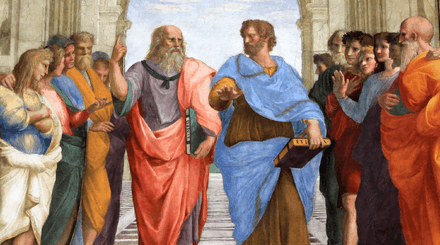Early modern philosophy
Early modern philosophy (also classical modern philosophy)[1][2] is a period in the history of philosophy at the beginning or overlapping with the period known as modern philosophy.
| History of Western philosophy |
|---|
 |
| The School of Athens fresco by Raphael |
| Western philosophy |
|
|
| See also |
Overview
The early modern period in history is roughly 1500–1789, but the label "early modern philosophy" is typically used to refer to a narrower period of time.[3]
In the narrowest sense, the term is used to refer principally to the philosophy of the 17th century and 18th century, typically beginning with René Descartes. 17th-century philosophers typically included in such analyses are Thomas Hobbes, Blaise Pascal, Baruch Spinoza, Gottfried Wilhelm Leibniz, and Isaac Newton. The 18th century, often known as the Age of Enlightenment, included such early modern figures as John Locke, George Berkeley, and David Hume.[2]
The term is sometimes used more broadly, including earlier thinkers from the 16th century such as Niccolò Machiavelli, Martin Luther, John Calvin, Michel de Montaigne, and Francis Bacon.[4] Some definitions also broaden the range of thinkers included under the "early modern" moniker, such as Voltaire, Giambattista Vico, Thomas Paine. By the broadest definition, the early modern period is said to have ended in 1804 with the death of Immanuel Kant. Considered in this way, the period extends all the way from the last Renaissance philosophers to the final days of the Age of Enlightenment.
See also
- Late modern philosophy
- Phases of modernity
Notes
- Jeffrey Tlumak, Classical Modern Philosophy: A Contemporary Introduction, Routledge, 2006, p. xi: "[Classical Modern Philosophy] is a guide through the systems of the seven brilliant seventeenth- and eighteenth-century European philosophers most regularly taught in college Modern Philosophy courses".
- Richard Schacht, Classical Modern Philosophers: Descartes to Kant, Routledge, 2013, p. 1: "Seven men have come to stand out from all of their counterparts in what has come to be known as the 'modern' period in the history of philosophy (i.e., the seventeenth and eighteenth centuries): Descartes, Spinoza, Leibniz, Locke, Berkeley, Hume and Kant".
- Marshall Berman. 1982. All That Is Solid Melts into Air: The Experience of Modernity. New York: Simon and Schuster. ISBN 0-671-24602-X. London: Verso. pp. 16–17. ISBN 0-86091-785-1. Paperback reprint New York: Viking Penguin, 1988. ISBN 0-14-010962-5.
- Brian Leiter (ed.), The Future for Philosophy, Oxford University Press, 2006, p. 44 n. 2.
References
- Early Modern Philosophy: Essential Readings with Commentary, ed. by Aloysius Martinich, Fritz Allhoff, Anand Vaidya (2006).
- Early Modern Philosophy: Mind, Matter, and Metaphysics, ed. by Christia Mercer and Eileen O'Neill (2005).